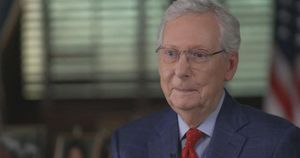The political waters surrounding Richard Ferrand's expected rise to the head of France's Constitutional Council have become tumultuous, heralding potential challenges for both him and the government. Proposed by President Emmanuel Macron as the successor to Laurent Fabius, Ferrand's nomination, set for parliamentary approval, faces scrutiny from various political factions, particularly the right.
On February 13, 2024, Laurent Wauquiez, the head of the Republican deputies (LR), stirred the pot by declaring Ferrand's profile "problematic." Wauquiez, who is also vying for the presidency of the LR party, articulated concerns centered around Ferrand's former ties to the Socialist Party and his role as a significant supporter of Macron.
"It's a personality who is from the Socialist Party, who has been one of the main political supporters of macronism," Wauquiez told Le Figaro, steeping the conversation about Ferrand's potential leadership role with added tension.
Ferrand, 62, served as the president of the National Assembly from 2018 to 2022 and is seen as 'a faithful ally' of Macron, which raises alarms among those who fear this closeness could taint the perception of the Constitutional Council's impartiality. With Fabius stepping down after nine years, the path for Ferrand is fraught with potential obstacles.
The parliamentary hearings to validate his nomination are set for February 19, 2024, and Ferrand must avoid the ire of the commissions of laws from both the Senate and the Assembly. Obstruction could occur if his opponents unite against him, requiring three-fifths of the votes from these commissions—this translates to at least 74 votes from 122 potential ones.
Political dynamics complicate matters. Wauquiez's critiques resonate within the LR and among the right, which may not easily align with Macron's administration. He indicated the voting directive would be decided collectively, urging opposition to Ferrand's candidacy. This perspective is echoed across multiple parliamentary groups, including the National Rally and La France Insoumise, signaling the potential for concerted resistance.
The stakes are high as the composition of Parliament has evolved significantly, making any prior assumptions about uncomplicated backing from traditional allies more precarious. With the Senate under right and center-right control, the influence of LR will be fundamental for Ferrand's advancement.
Adding to this complexity is the adversarial backdrop stemming from recent Constitutional Council decisions. Wauquiez previously dubbed one of those decisions—a substantial censorship of immigration legislation—a "constitutional coup." This historical bitterness shapes the current climate as opposition parties leverage Ferrand’s background against him.
Looking to the future, if the nomination does not pass muster, avenues remain open for Macron to propose alternative candidates. Should Parliament reject Ferrand, Macron could select someone more neutral politically, perhaps to maintain stability within the politically vexed environment of French governance.
Legal experts point to historical practices and constitutional requirements governing these nominations. The scrutiny placed on Ferrand's background sparks conversations about the importance of whether judicial appointments can be perceived as politically tainted. Law professor Mathieu Carpentier highlights potential ramifications, stating, "A Constitutional Council seen as lacking legitimacy could weaken our institutions, particularly if we face elections with high stakes like those looming with Marine Le Pen's candidacy."
Ferrand's upcoming audition poses questions beyond his qualifications, with the overarching sentiment being how politics evolves around the choices made within high-stakes institutional roles. Should he secure the position, the political undercurrents may define not just his leadership but also the direction of France's highest court for years to come.
Indeed, Ferrand’s nomination is emblematic of larger issues within France's political arena, including the challenges faced by the Macron administration and the broader debate over the judiciary's independence. Observers will be watching closely as the February 19 hearings approach, marking a pivotal moment for Richard Ferrand and the potential future actions of the Constitutional Council.



